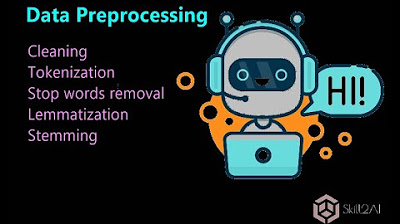How I'd Learn NLP in 2024 (If I Had to Start Over)
Summary
TLDRThis video serves as a comprehensive guide for anyone keen on learning natural language processing (NLP) in 2024. It emphasizes the importance of understanding language fundamentals, acquiring programming skills with Python, and grasping the basics of machine learning and deep learning. The speaker recommends key resources, including 'Cambridge Handbook of Linguistic Theories' and Andrew NG's courses, and stresses the significance of the Transformer architecture and attention mechanisms in modern NLP models. The video also encourages viewers to engage in projects and stay updated with industry advancements through newsletters, positioning them as valuable NLP talents in the job market.
Takeaways
- 📚 Start with language fundamentals by reading books like the 'Cambridge Handbook of Linguistic Theories' to understand the nuances of natural language.
- 💻 Learn Python as a beginner-friendly programming language and progress to libraries like NumPy, pandas, NLTK, and advanced tools like TensorFlow and Hugging Face.
- 🎓 Take courses on machine learning basics and deep learning, with recommendations including Andrew NG's courses on Coursera and Michael Nielsen's book 'Neural Networks and Deep Learning'.
- 📈 Gain hands-on knowledge of NLP techniques and terminologies by studying resources like the book 'Speech and Language Processing' by Dan Jurafsky.
- 🧠 Understand the Transformer architecture and its components like self-attention, multi-head attention, positional encoding, and the differences between models like GPT and BERT.
- 🔍 Explore and practice NLP on platforms like Kaggle, which offer datasets and problem statements to apply your learnings.
- 🚀 Work on real-world projects to apply your NLP knowledge and create end-to-end solutions that can be showcased in your portfolio.
- 📰 Subscribe to newsletters to stay updated with the latest advancements and trends in the NLP field.
- 💼 Becoming well-versed in both the basics and the latest developments in NLP can make you a strong candidate for data science or machine learning engineering roles.
- 🤗 Sharing this knowledge with others who are interested in NLP can help build a community and enhance your own learning through teaching and collaboration.
Q & A
What is the first step recommended for learning natural language processing?
-The first step recommended for learning natural language processing is to learn about language fundamentals and how language operates. The Cambridge Handbook of Linguistic Theories is recommended for understanding the nuances of natural language.
Why is it important to have a good understanding of language before learning NLP?
-Having a good understanding of language is important because NLP is not just about feeding in numbers and getting responses; it involves understanding the subtleties of natural language, which is crucial for creating effective NLP solutions.
Which programming language is recommended to start with for learning NLP?
-Python is recommended as the programming language to start with for learning NLP due to its beginner-friendly nature and the availability of numerous libraries that are essential for NLP tasks.
What are some of the libraries and tools mentioned for learning NLP with Python?
-Some of the libraries and tools mentioned for learning NLP with Python include NumPy, pandas, NLTK (Natural Language Toolkit), spaCy, TensorFlow, and Hugging Face models.
What is the significance of learning machine learning and deep learning in the context of NLP?
-Learning machine learning and deep learning is significant in the context of NLP because most NLP models, including advanced ones like chatbots and language models, are based on these concepts. They form the foundation for understanding and implementing complex NLP systems.
Which course is recommended for learning the basics of machine learning for NLP?
-Andrew NG's machine learning introduction course on Coursera is recommended for learning the basics of machine learning for NLP. It's a free course that has been taken by millions of users.
What book is suggested for understanding the fundamentals of deep learning?
-For understanding the fundamentals of deep learning, the book 'Neural Networks and Deep Learning' by Michael Nielsen is suggested.
Why is the book 'Speech and Language Processing' by Dan Jurafsky recommended for NLP learners?
-The book 'Speech and Language Processing' by Dan Jurafsky is recommended because it covers the small integrities of NLP techniques and terminologies in a systematic approach, which is essential for understanding the building blocks of NLP solutions.
What is the importance of understanding the Transformer architecture in NLP?
-Understanding the Transformer architecture is important because it is the basis for most modern NLP models. It includes concepts like self-attention, multi-head attention, positional encoding, and the roles of encoder and decoder blocks, which are crucial for advancing in the field of NLP.
How does the speaker recommend staying updated with the latest advancements in NLP?
-The speaker recommends staying updated with the latest advancements in NLP by working on projects, subscribing to newsletters, and following authentic sources that provide updates on the field's progress.
What is the role of projects in learning and demonstrating NLP skills?
-Projects play a crucial role in learning and demonstrating NLP skills by allowing learners to apply their knowledge to real-world problems, create end-to-end solutions, and showcase their practical abilities, which can be beneficial for job applications or personal growth in the field.
Outlines

此内容仅限付费用户访问。 请升级后访问。
立即升级Mindmap

此内容仅限付费用户访问。 请升级后访问。
立即升级Keywords

此内容仅限付费用户访问。 请升级后访问。
立即升级Highlights

此内容仅限付费用户访问。 请升级后访问。
立即升级Transcripts

此内容仅限付费用户访问。 请升级后访问。
立即升级浏览更多相关视频

Natural Language Processing (Part 1): Introduction to NLP & Data Science

What is NLP (Natural Language Processing)?

Prerequisites For NLP Live Community Session For ML And DL

Natural Language Processing In 5 Minutes | What Is NLP And How Does It Work? | Simplilearn

The History of Natural Language Processing (NLP)

Text Preprocessing | tokenization | cleaning | stemming | stopwords | lemmatization
5.0 / 5 (0 votes)
